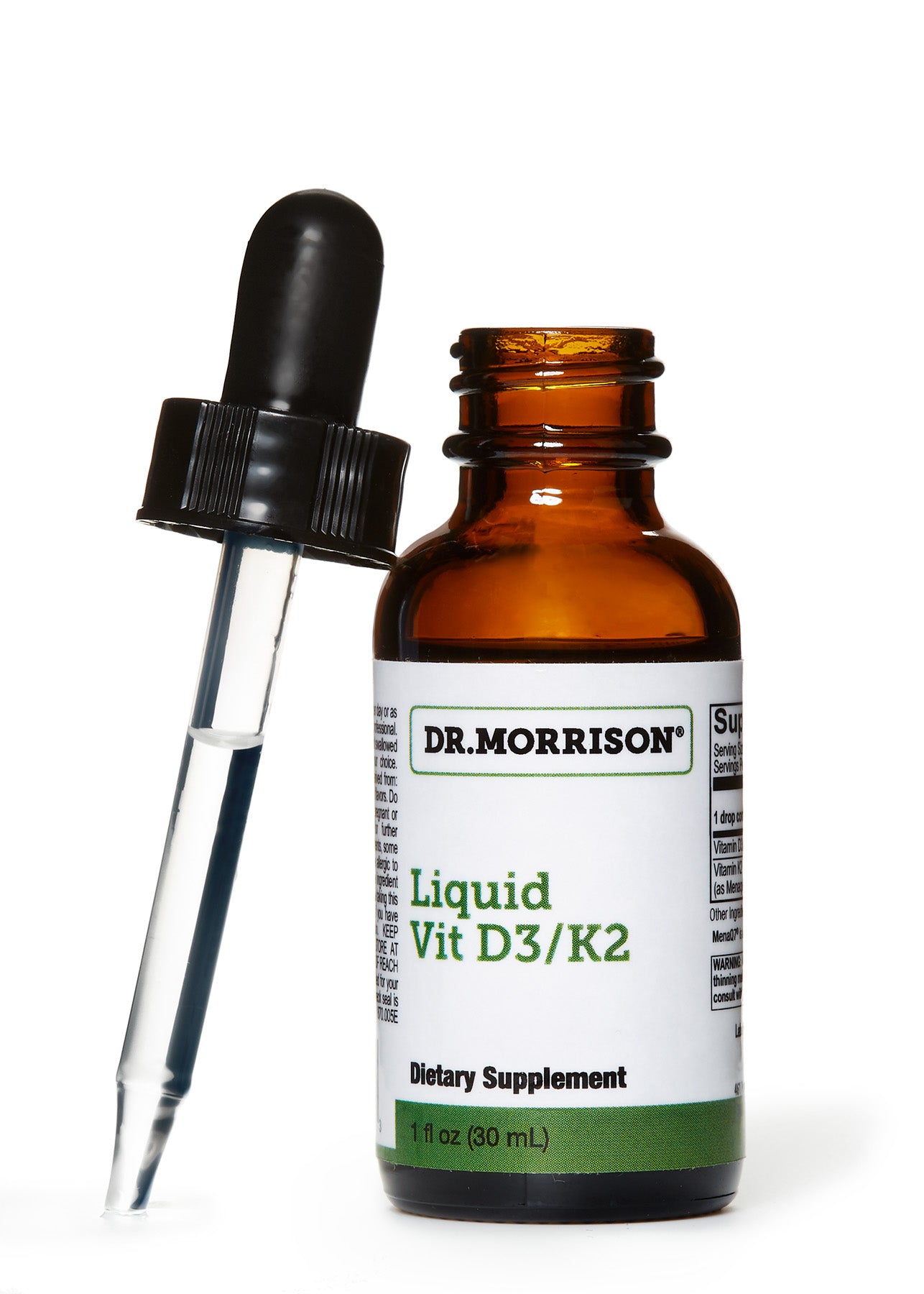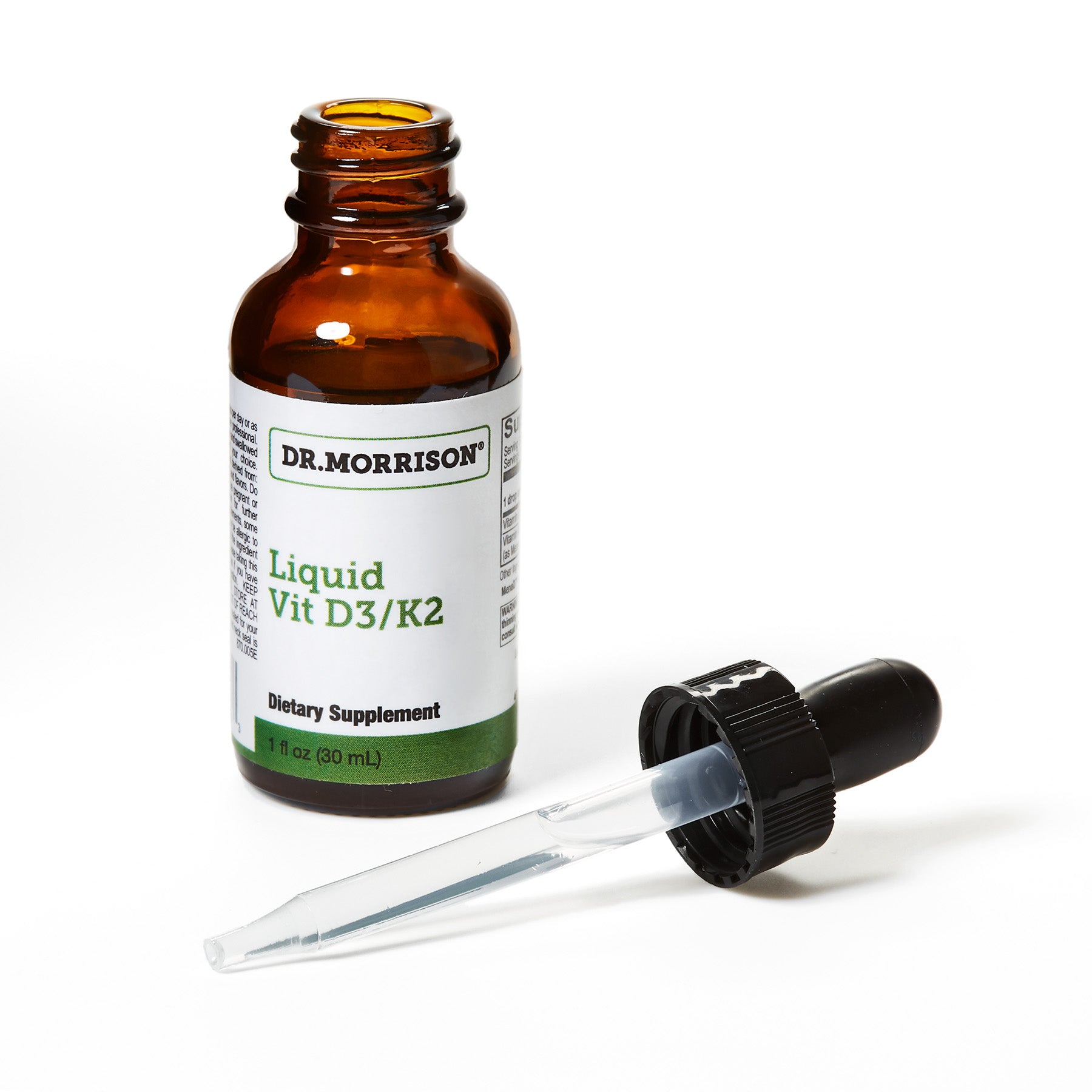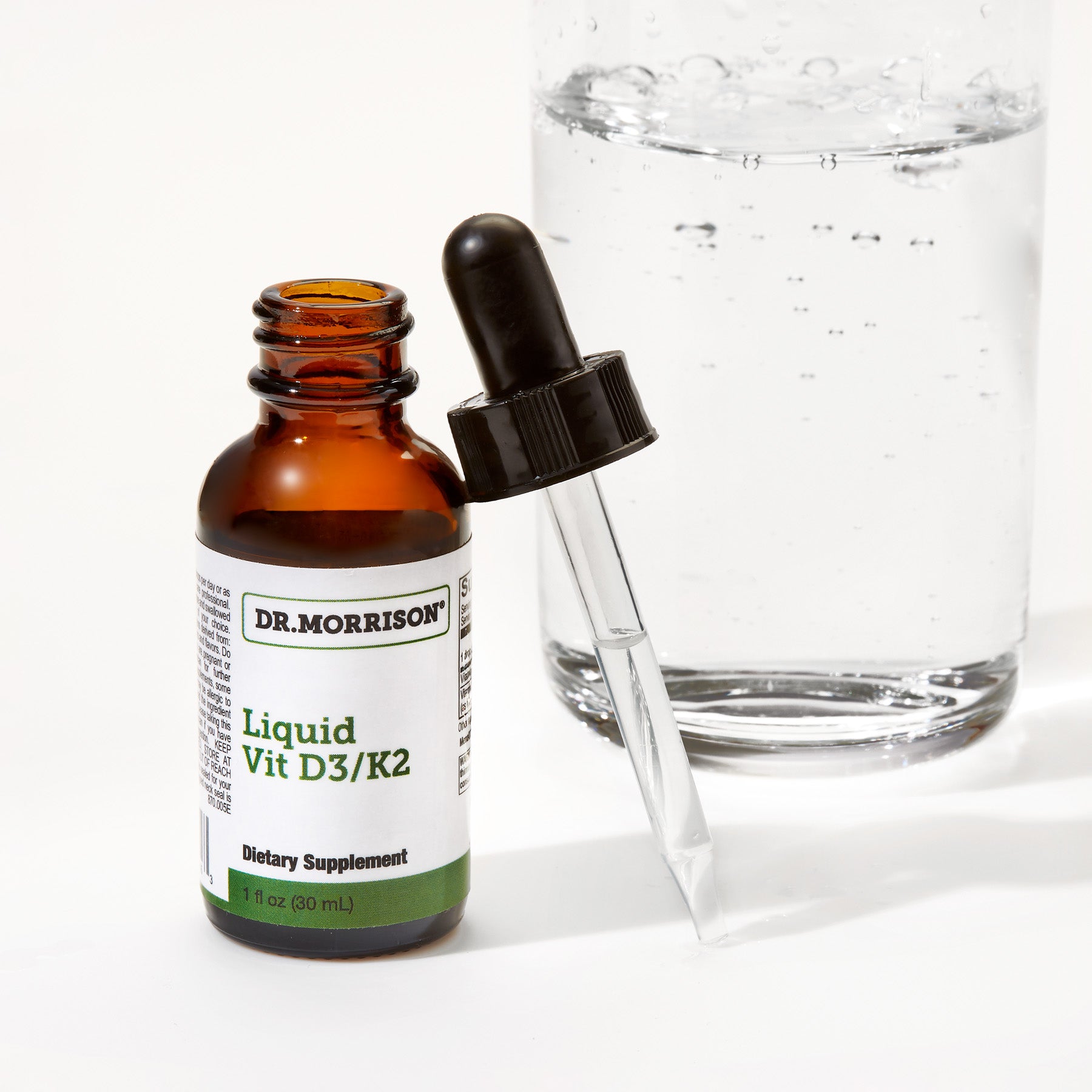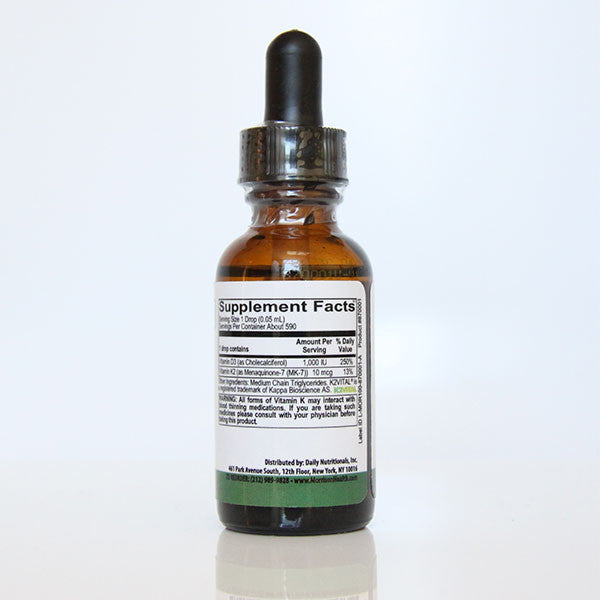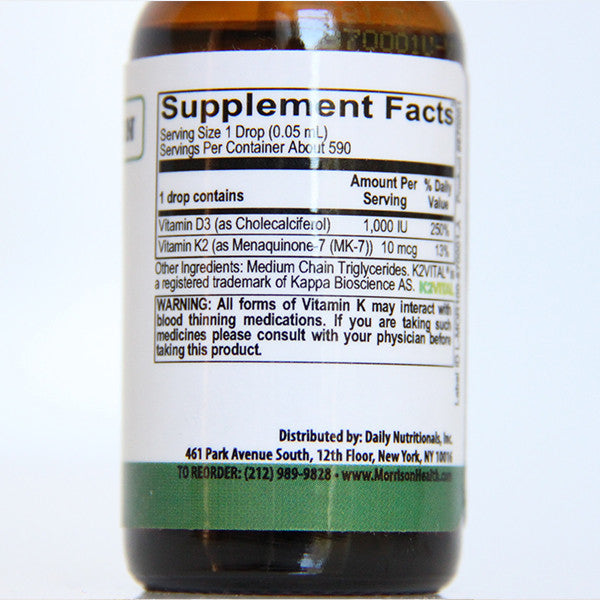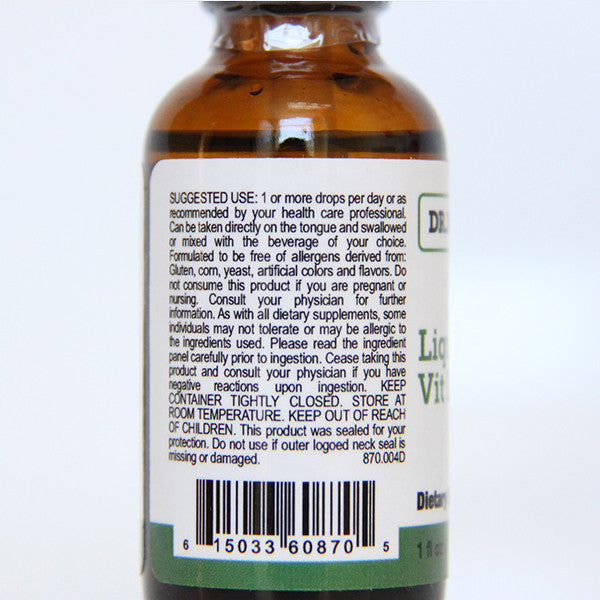Liquid Vitamin D3/K2
$ 44.00
Size: 1 fl oz (30 ml)
Liquid Vitamin D3 with K2 for Immunity, Healthy Bones, and Cardiovascular Function
Please select all options.
Liquid Vitamin D3/K2 provides a balanced formula of vitamins D3 and K2 in an easy-to use liquid form. A growing body of research shows that the combination of these two vitamins provides optimal support to the body, including bone health, arterial health, and immune system balance.*
- Supports Bone Health*: Vitamin D stimulates calcium absorption and reduces calcium excretion, encouraging the maintenance of healthy bones. Vitamin K2 works synergistically with D3 to keep calcium in bones and out of soft tissues like the heart.1
- Supports Brain Health*: Positive associations have been found between adequate serum vitamin D and cognitive function.2,3
- Promotes Healthy Immunity*: Higher blood levels of D3 and K2 have been linked with stronger immune function and a balanced inflammatory response,4 which may help protect against infection,5 autoimmunity, and certain cancers.*
- Improves Athletic Performance*: Studies have shown that vitamin D can help increase aerobic capacity, muscle growth, and strength.6
- Improves Body Composition*: Vitamin D insufficiency is associated with obesity,7 and vitamin D supplementation has been shown to assist in weight loss.*[8]
- Supports Cardiovascular Health*: Vitamin D and K have been shown to have a synergistic, protective effect against vascular calcification.*[9,10]
Research finds that nearly half of Americans are vitamin D deficient, and many experts believe higher levels are needed for optimal health.11 Vitamin D is best obtained from natural sun exposure, but living at northern latitudes, spending daytimes indoors, and air pollution make it nearly impossible to get enough. Furthermore, low vitamin D has been correlated with countless chronic conditions and our needs increase with age, so supplementation may be beneficial.12
*These statements have not been evaluated by the FDA and are not intended to treat or cure any disease.
Liquid Vitamin D3/K2 one of our absolute essentials for all-around health. You might benefit from this supplement if you…
- Need support for bone growth and density
- Want to support your immune system
- Do not get enough sun exposure
- Do not eat vitamin D-rich foods, like duck eggs, sardines, mackerel, and liver
- Are physically active
The liquid dropper form allows for control and flexibility with your dose of these important vitamins. With 1,000IU of D3 and 10mcg of K2 in each drop, you can find the optimal dose that works for you.
Dr. Morrison’s Vitamin D3/K2 provides the most potent forms of these essential vitamins for maximum benefit. Vitamin D3 (cholecalciferol) is the most bioavailable form of supplemental vitamin D, easily converted to active calcitriol in the kidneys.
Vitamin K occurs in many forms, but numerous studies have shown that the MK-7 form of Vitamin K2 is the most bioactive and bioavailable, with greater absorption and a longer half life than other forms such as MK-4 or K1.13,14 Dr. Morrison’s D3/K2 contains the patented MK-7 MenaQ7® PRO, the most widely-studied form of MK-7 with over 15 clinical trials.
1 DROP (0.05 ML) PER SERVING
Vitamin D (D3 as Cholecalciferol) 25 mcg (1,000 IU)
Vitamin K2 (as Menaquinone-7 (MK-7)) (MenaQ7®PRO) 10 mcg
Other Ingredients: Medium Chain Triglycerides.
1 or more drops per day or as recommended by your health care professional. Can be taken directly on the tongue and swallowed or mixed with the beverage of your choice.
Cautions: Do not consume this product if you are pregnant or nursing. All forms of vitamin K may interact with blood thinning medications. If you are taking such medicines, please consult your physician before taking this supplement.
In the past decade it has become evident that vitamin K has a significant role to play in human health that is beyond its well-established function in blood clotting. There is a consistent line of evidence in human epidemiologic and intervention studies that clearly demonstrates that vitamin K can improve bone health. The human intervention studies have demonstrated that vitamin K can not only increase bone mineral density in osteoporotic people but also actually reduce fracture rates. Further, there is evidence in human intervention studies that vitamins K and D, a classic in bone metabolism, works synergistically on bone density. Most of these studies employed vitamin K(2) at rather high doses, a fact that has been criticized as a shortcoming of these studies. However, there is emerging evidence in human intervention studies that vitamin K(1) at a much lower dose may also benefit bone health, in particular when coadministered with vitamin D. Several mechanisms are suggested by which vitamin K can modulate bone metabolism. Besides the gamma-carboxylation of osteocalcin, a protein believed to be involved in bone mineralization, there is increasing evidence that vitamin K also positively affects calcium balance, a key mineral in bone metabolism. The Institute of Medicine recently has increased the dietary reference intakes of vitamin K to 90 microg/d for females and 120 microg/d for males, which is an increase of approximately 50% from previous recommendations.
In vitro data suggest protective roles for vitamins K and D in inflammation. To examine associations between vitamins K and D and inflammation in vivo, the authors used multiple linear regression analyses, adjusted for age, sex, body mass index, triglyceride concentrations, use of aspirin, use of lipid-lowering medication, season, menopausal status, and hormone replacement therapy. Participants were from the Framingham Offspring Study (1997-2001; n = 1,381; mean age = 59 years; 52% women). Vitamin K status, measured by plasma phylloquinone concentration and phylloquinone intake, was inversely associated with circulating inflammatory markers as a group and with several individual inflammatory biomarkers (p < 0.01). Percentage of undercarboxylated osteocalcin, a functional measure of vitamin K status, was not associated with overall inflammation but was associated with C-reactive protein (p < 0.01). Although plasma 25-hydroxyvitamin D was inversely associated with urinary isoprostane concentration, an indicator of oxidative stress (p < 0.01), overall associations between vitamin D status and inflammation were inconsistent. The observation that high vitamin K status was associated with lower concentrations of inflammatory markers suggests that a possible protective role for vitamin K in inflammation merits further investigation.


